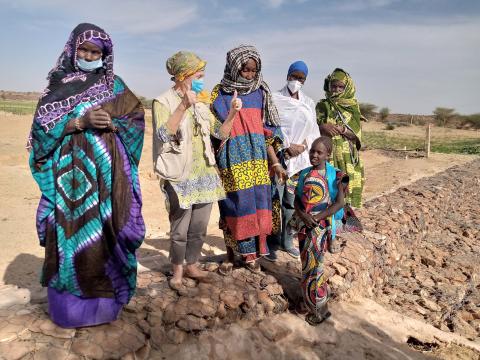UNICEF Regional Director for West and Central Africa makes an official visit to Assaba with World Vision

Mrs. Marie Pierre Poirier, Regional Director for West and Central Africa at UNICEF, last week visited a World Vision project funded by UNICEF in partnership with the WFP in Assaba. This visit allowed Ms. Poirier to exchange with project beneficiaries, as well as with administrative authorities and the technical team in charge of implementation and monitoring.
The Project for Strengthening the Resilience of the Communities Most Vulnerable to Malnutrition and Food Insecurity is implemented in six Mauritanian Communes of the Moughataa of Kiffa in the Wilaya of Assaba for a period of 12 months, and with a budget of 116,712 US$.
The project is an integrated model of MAS care and promotion of ANJE's (Alimentation du Nourrisson et du Jeune Enfant - Infant and Young Child Feeding) best practices at the level of health structures and at the community level. It is based on the Infant and Young Child Feeding Practice Monitoring and Learning Groups (ICMLG) and the Basic Health Units (BHUs).
Among activities visited were:
ICMLGs or GASPAs (Groupes d'Apprentissage et de Suivi des Pratiques optimales d'Alimentation du nourrisson et du jeune enfant):
- Contribute to the promotion of ANJE's good practices.
- Custodial mothers are trained in the PB Mother Approach, which ensures the early detection of malnutrition.
- Monitor the consumption of micronutrient powders
- A GASPA model that aims to increase household purchasing power through the establishment of IGAs or support for food production and community dialogue.
- One GASPA groups 15 women (groups of pregnant women, women who breastfeed children under six months and women who breastfeed children 6-23 months). It is managed by a community intermediary under the supervision of the community leader.
Basic Health Units (BHUs)
- Community Platform for Community Care, providing preventive and curative health services, including health education; usually housed within health posts
- Managed by a Community Health Worker (CHW) trained by the Minister of Health and ensures the treatment of uncomplicated SAM children. The CHW works in collaboration with the management committee at the village level.
- First level of contact of the population with health services and the reference level for basic health units. It ensures curative and preventive health activities, particularly for the protection of maternal and child health.